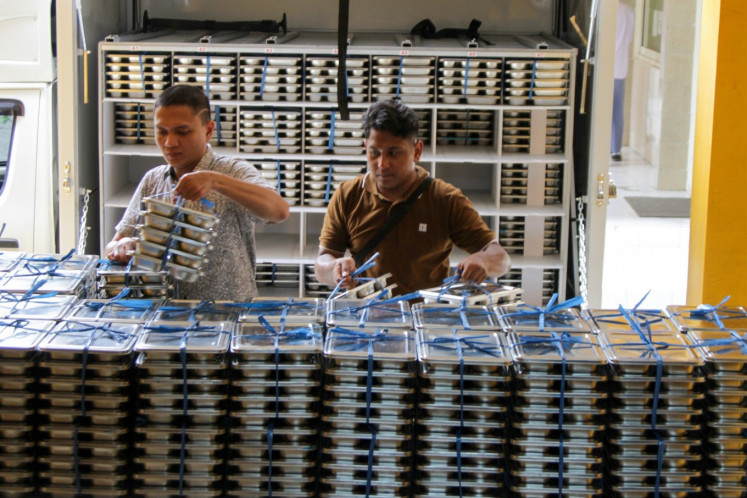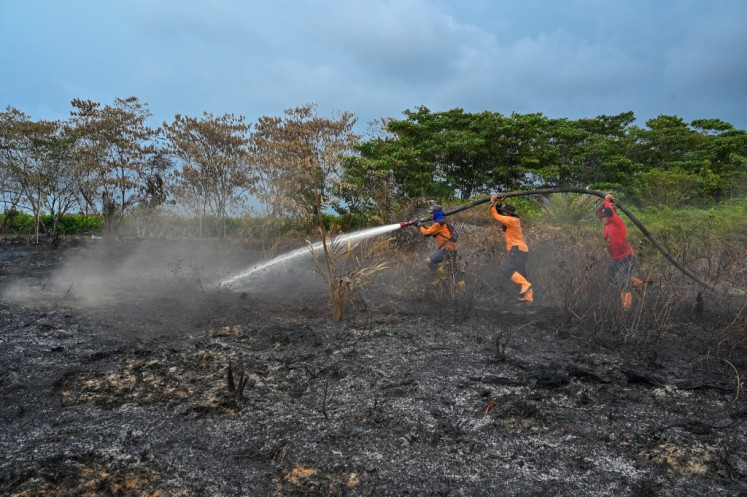RI will notify WTO on horticulture import rules
As if seeking validations for the move to limit the import gateway for horticulture produce, the Indonesian government will notify the World Trade Organization (WTO) and clarify that such a move is necessary to ensure consumer health and safety
Change text size
Gift Premium Articles
to Anyone

A
s if seeking validations for the move to limit the import gateway for horticulture produce, the Indonesian government will notify the World Trade Organization (WTO) and clarify that such a move is necessary to ensure consumer health and safety.
Trade Minister Gita Wirjawan said on Wednesday that Indonesia had the right to implement whatever mechanism to ensure health and safety as condoned by international norms, but a notification to the trade governing body was necessary.
“We will [notify the WTO] soon. An import arrangement such as has been demonstrated by advanced as well as developing countries takes health and safety into account,” Gita said on Wednesday.
Later in the day, Gita said that his ministry would coordinate with the quarantine agency and the Agriculture Ministry for the notification to the WTO.
“It will be normal for us, as a matter of courtesy, to explain this to the WTO at some point,” he told The Jakarta Post in an emailed statement.
Last December, the agriculture minister passed a set of new regulations that reduced the number of entry gateways from eight to four for imported horticulture products, covering 47 kinds of fresh fruits and vegetables as well as fresh-layered tuber vegetables, starting on March 19. The entry gateways are Belawan seaport in Medan, Soekarno-Hatta International Airport in Jakarta, Tanjung Perak seaport in Surabaya and Soekarno-Hatta seaport in Makassar.
Tanjung Priok in North Jakarta, which is the port that handles most of the country’s export and import activities, would be excluded from the lists of import gateways due to capacity overload that led to the poor supervision of imported goods in past.
On Tuesday, Agriculture Minister Suswono announced that the regulations would be delayed until June 19 to allow local and overseas stakeholders to make sufficient preparations to comply with new rules. The government would also allow horticulture imports through seaports in the Riau Islands’ free-trade zones of Batam, Bintan and Karimun to meet demand in the areas.
Indonesia’s trading partners, including the US and Australia, have voiced their concerns about the upcoming changes in importing rules, fearing disruptions in their exports of fruits and vegetables to the biggest market in Southeast Asia.
“We look forward to using this additional time to work with the Indonesian government to fully resolve this issue,” US Embassy spokesperson Troy Pederson said on Wednesday, referring to the three month delay.
Ray Marcello, the spokesperson of the Australian Embassy to Indonesia, said that the Australian government also welcomed the three-month delay.
“We will continue to work closely with the Indonesian government to ensure the supply of quality horticulture products for Indonesian consumers,” he said in a text message.
Gita said that the Trade Ministry was also preparing a regulation which had the “same spirit” as the import gateway limitation policy, which was to ensure health and safety.
“At the end, we will prohibit (imported) fruits coated with formalins and vegetables cultivated with pesticides from being sold on our domestic market. There should be a process and mechanism to filter such kinds of products from being directly sold here,” he explained.
The Agriculture Ministry’s Quarantine Agency chief, Banun Harpini, said the government was not required to notify the WTO .
“Such an arrangement is not regulated by the WTO and any country has its own authority to determine the appropriate level of protection,” Banun said in a text message sent to the Post.









